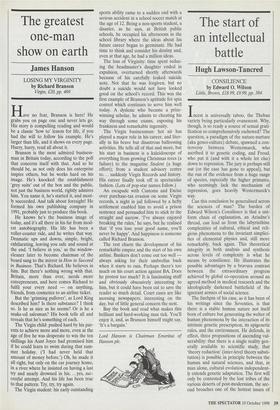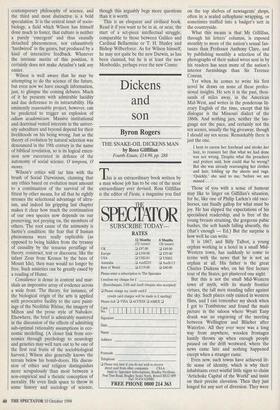The start of an intellectual battle
Hugh Lawson-Tancred
CONSILIENCE by Edward 0. Wilson Little, Brown, 178.99, 51.99, pp. 384 Incest is universally taboo, the Theban variety being particularly evanescent. Why, though, is so ready a source of sexual grati- fication so comprehensively eschewed? The question, a paradigm of the nature-nurture (aka genes-culture) debate, spawned a con- troversy between Westermarck, who ascribed it to genetic coding, and Freud, who put it (and with it a whole lot else) down to repression. The jury is perhaps still out (or the case has gone to appeal), but the run of the evidence from a huge range of species, especially the higher primates, who seemingly lack the mechanism of repression, goes heavily Westermarck's way.
Can this conclusion be generalised across the sciences of man? The burden of Edward Wilson's Consilience is that a uni- form chain of explanation, an Ariadne's thread, can lead us from the labyrinthine complexities of cultural, ethical and reli- gious phenomena to the invariant simplici- ties of elemental physics and, still more remarkably, back again. This theoretical integrity in both analysis and synthesis across levels of complexity is what he means by consilience. He illustrates the possible advantages by a bravura contrast between the extraordinary progress achieved by global co-operation around an agreed method in medical research and the ideologically darkened battlefield of the ignorant armies of social science.
The linchpin of his case, as it has been of his writings since the Seventies, is that there is a stable human nature not itself born of culture but generating the welter of human phenomena by the interaction of its intrinsic genetic prescription, its epigenetic rules, and the environment. He defends, in effect, three propositions of ascending vul- nerability: that there is a single reality gen- erally available to scientific study, that 'theory reduction' (inter-level theory substi- tution) is possible in principle between the human and natural sciences, and that, in man alone, cultural evolution independent- ly extends genetic adaptation. The first will only be contested by the lost tribes of the various deserts of post-modernism, the sec- ond broaches one of the hottest issues of contemporary philosophy of science, and the third and most distinctive is a bold speculation. It is the central tenet of socio- biology, a field which Wilson has himself done much to foster, that culture is neither a purely 'emergent' and thus causally detached phenomenon, nor exhaustively 'hardwired' in the genes, but produced by a kind of interactive feedback. Whatever the intrinsic merits of this position, it certainly does not make Ariadne's task any easier.
Wilson is well aware that he may be attempting to do the science of the future, but even now we have enough information, just, to glimpse the coming debates. Much of it he presents with admirable lucidity and due deference to its intractability. His eminently reasonable project, however, can be predicted to trigger an explosion of odium academicum. Massive institutional and doctrinal vested interests in the univer- sity subculture and beyond depend for their livelihoods on his being wrong. Just as the theory of evolution by natural selection was denounced in the 19th century in the name of biblical revelation, so is its logical exten- sion now excoriated in defence of the autonomy of social science. 0 tempora, 0 mores.
Wilson's critics will tar him with the brush of Social Darwinism, claiming that any ethics based on evolution must amount to a continuation of the survival of the fittest by other means, for all that he rightly stresses the selectional advantage of altru- ism, and indeed his gripping last chapter makes it clear how much the continuation of our own species now depends on our preserving, not preying on, the members of others. The root cause of the animosity is Sartre's condition: the fear that if human phenomena were really explicable (as opposed to being hidden from the tyranny of causality by the tenuous persiflage of theory, construct, text or discourse, like the infant Zeus from ICronos by the bees of Mount Ida), then man would no longer be free. Such anxieties can be greatly eased by a reading of Hume.
Consilience is dense in content and mar- shals an impressive array of evidence across a wide front. The theory, for instance, of the biological origin of the arts is applied with provocative facility to the cave paint- ings of the Neolithic Rhone, the imagery of Milton and the prose style of Nabokov. Elsewhere, the brief is admirably mastered in the discussion of the effects of admitting sub-optimal rationality assumptions in eco- nomic modelling. (A closer link from eco- nomics through psychology to neurology and genetics may well turn out to be one of the first real fruits of the sociobiological harvest.) Wilson also generally knows the terrain below his bomb-doors. His discus- sion of ethics and religion distinguishes more scrupulously than most between a non-empirical and a theistic conception of morality. He even finds space to throw in some history and sociology of science, though this arguably begs more questions than it is worth.
This is an eloquent and civilised book. Read it if you want to be in at, or near, the start of a set-piece intellectual struggle, comparable to those between Galileo and Cardinal Bellarmine or T. H. Huxley and Bishop Wilberforce. As for Wilson himself, he may not quite be the new Darwin, as has been claimed, but he is at least the new Monboddo, perhaps even the new Comte.











































































 Previous page
Previous page